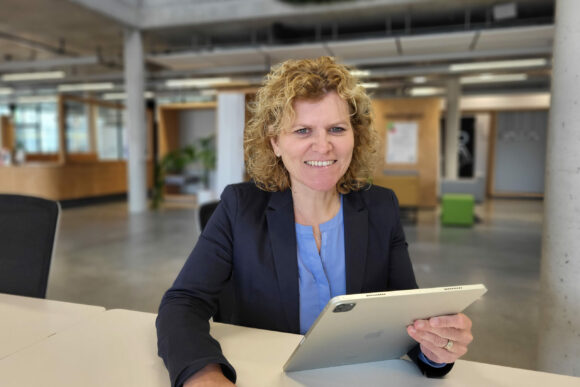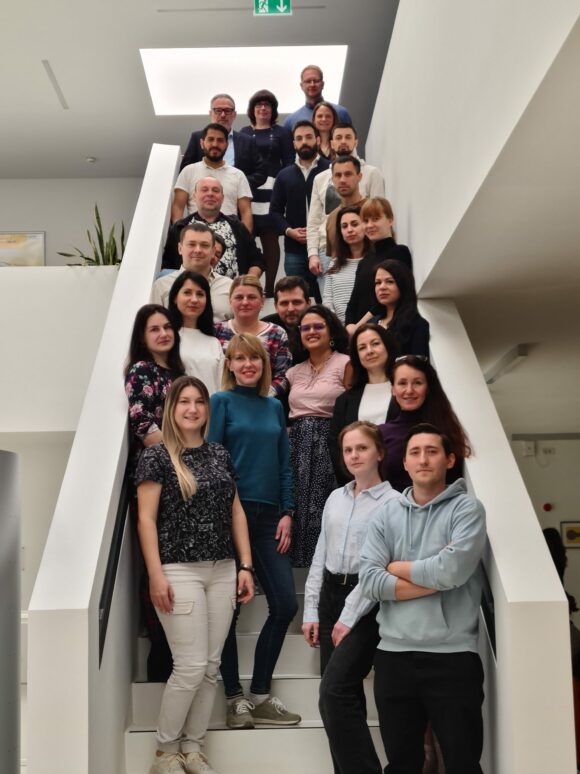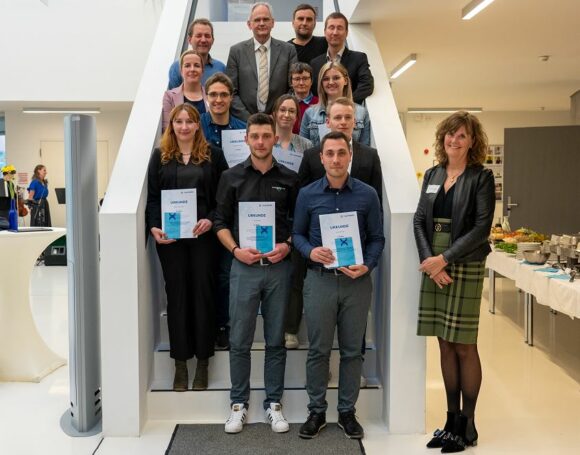Vice President Dietmar Wolff, responsible for teaching at Hof University of Applied Sciences, spoke with journalist Sascha Lobo about Digital Care Applications (DiPAs) at the Digital Health Award 2022, supported by the Novartis company and under the patronage of Lebenshilfe.

Visibility and tailwind for the still little-known apps in care and healthcare that can be prescribed by doctors and paid for by health insurers – this was the focus of this year’s Health Award. A topic that is also close to Dietmar Wolff’s heart, as he himself conducts research in the topic area of “Innovative Healthcare”
Useful apps in healthcare are one side of digitization that is not talked about enough.”
Prof. Dr. Dietmar Wolff, Vice President Hof University of Applied Sciences
In the care sector, there are now digital applications that help caregiving relatives in their everyday lives and provide them with professional support. These are “applications for us” – he confirms to Lobo – in other words, “applications that serve as a supplement for caregivers.”
Health truck “TruDi” to try out
While the German Federal Ministry of Health works on the law to reform the nursing profession, companies can discover a market for themselves in the field of digital nursing applications, from start-ups to corporations. Artificial intelligence is a focus at the Institute of Information Systems, and it offers big opportunities here in data analytics: the pulse network truck of digitalization, nicknamed “TruDi,” for example, is equipped with ground sensors that record a person’s gait. The AI derives the risk of falls from this and makes recommendations for prevention and medication. If interested care facilities want to try out the truck’s equipment for themselves, it will come to their professional doorstep (“Campuls-digital” already reported on “TruDi”).
Health technology on the rise
Other topics in the livestream included digital health applications (DiGAs), innovative networking solutions and medical technology (MedTech) and AI-based solutions. Another interview guest on these topics was Dr. Isabella Erb-Hermann from AOK Hessen. On networking in the healthcare system, she sees potential for improvement, for example, in discharge letters that go from the hospital to the attending medical staff. Sascha Lobo spoke with Professor Sylvia Thun from Charité Berlin about medical technology, standardization of databases and synchronization in patient files.
There was also information on the digital health applications from Hello Better, last year’s winners, which offer immediate psychological help and created offerings for underserved topics such as support for vaginismus.
The shortlist of DiGAs this year included Munevo, smart glasses for people with disabilities. BaSeTaLK allows nursing home residents to take virtual trips.
EisApp is an inclusive app for children with speech development disorders and their families that lets them learn German sign language through play, and was this year’s special award winner. Diafyt offers support to those affected by diabetes. Halitus measures and interprets the concentration of various disease-relevant biomarkers in the air we breathe and is this year’s Digital Health Award winner. KONTAKT provides eye-controlled communication technology for people with disabilities, and PINK!, runner-up for the Digital Health Award, provides processed information for breast cancer patients.
Hof University of Applied Sciences researches digital health
The topic of digital health is the focus of several research groups at the iisys at Hof University of Applied Sciences. In addition to Innovative Health Care, the research group that oversees the digitalization truck, Analytical Information Systems deals with rare diseases. “Campuls-digital” already reported on SelEe and on the topics of headaches and migraines as well as the Corona vaccination.
In addition to digitization, medical products are also being developed for practical use: For example, heart stents are braided at the Institute of Material Sciences in Münchberg







